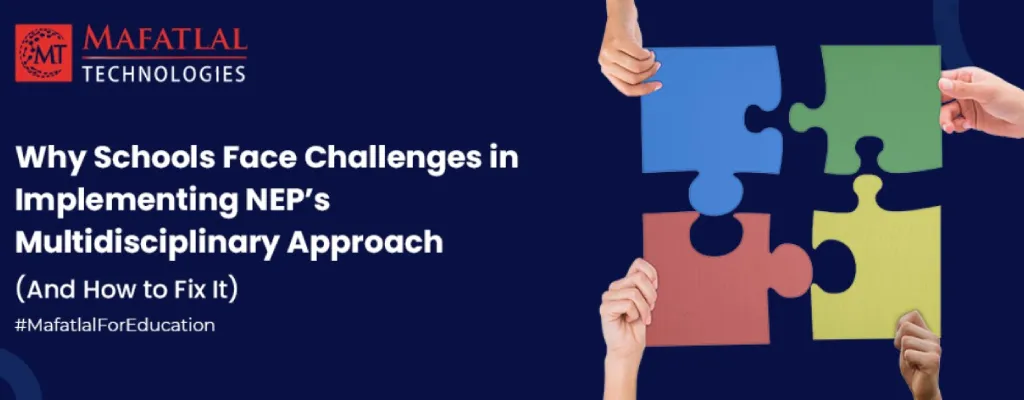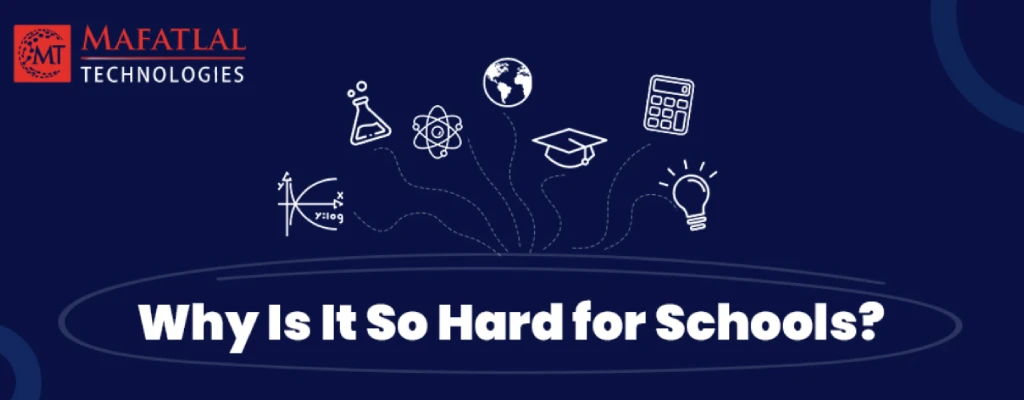The National Education Policy (NEP) 2020 introduced a bold vision for reshaping India’s school system. A key part of that vision is multidisciplinary learning, where students are not restricted to traditional subject streams like Science, Commerce, or Arts.
Instead, they can combine subjects based on their interests and aspirations. For instance, a student passionate about Biology can also opt for Psychology or Music. Another might choose Mathematics along with Design or Entrepreneurship. This approach helps students learn different skills and think more broadly.
It calls for reworking timetables, lesson plans, assessments, and teacher training — all without disrupting daily operations. For educators and school leaders, this change brings both opportunities and challenges. With the right planning, support, and technology, schools can bring the NEP’s multidisciplinary ideals into practical reality that truly benefit students.
Why Is It So Hard for Schools?
The NEP 2020 encourages students to explore subjects across disciplines—think Physics with Philosophy or Mathematics paired with Music. The goal is to nurture well-rounded learners, capable of critical thinking beyond narrow academic silos.
But school systems were never originally designed for this kind of flexibility. Rigid timetables, fixed subject streams, and traditional teaching practices can make implementing multidisciplinary education feel complex.
For example, a well-established private school in Pune was eager to let students mix subjects like Economics, Psychology, and Computer Science. They soon realised that their timetable software wasn’t equipped for such combinations, and teachers needed additional resources to promote multidisciplinary collaboration and updated assessments.
Key Areas Schools Are Strengthening for Multidisciplinary Education
Infrastructure and Timetable Flexibility
Traditional school schedules often limit choice. Teachers are tied to fixed slots, and introducing flexible subject combinations needs careful coordination. Lab access, library use, and co-curricular sessions all need to be aligned.
Teacher Support for multidisciplinary Learning
Many teachers are deeply committed to creating meaningful learning experiences. But integrating content from different disciplines requires support and the right resources.
With proper orientation, peer collaboration, and modern tools, educators can confidently promote multidisciplinary approaches. Schools that consciously plan for such support often find smoother transitions.
Assessment Misalignment
Multidisciplinary education isn’t just about combining subjects; it’s about rethinking how student progress is measured. The focus must shift towards evaluating how well students connect concepts across different domains.
Conventional exams often fall short in capturing these broader learning outcomes. That’s where integrated assessment tools play an important role and help teachers track not just academic understanding, but also critical thinking, collaboration, and problem-solving skills across subjects.
Content and Resource Gaps
Schools implementing NEP’s multidisciplinary approach benefit from access to suitable, flexible teaching resources.
Take, for instance, a principal from a CBSE-affiliated school in Kerala shared how their faculty appreciated having NEP-aligned lesson plans, worksheets, and assessments that catered to the diverse learning needs of their classrooms. Ready-to-use resources make a significant difference, reducing time spent on manual preparation.
This is where AI-enabled learning platforms can assist educators. By supporting dynamic lesson planning, personalised content creation, and integrated assessments, these tools help teachers focus on what they do best: inspiring young minds.
How Technology Can Support Teachers, Not Replace Them?
Technology can never replace the human connection teachers bring to classrooms. But when thoughtfully integrated, it reduces administrative load, simplifies lesson planning, and assists teachers in enhancing their teaching practices.
AI-enabled learning platforms, for instance, can help schools:
- Design lesson plans that promote formal learning across disciplines
- Access peer-reviewed content and NEP-aligned resources
- Encourage collaboration between teachers from different departments
- Provide real-time insights to track student progress
- Support flexible assessment design beyond textbook-driven exams
How Mafatlal Technologies helps schools become NEP 2020 ready?
Review Existing Systems
Take stock of your current timetable, subject combinations, and staffing patterns. Are there practical ways to encourage flexibility in how students choose subjects? Consider whether infrastructure like lab schedules, library access, and co-curricular timings support this approach. Small adjustments here often make a big difference.
Encourage Teacher Collaboration
Workshops are a great start, but everyday collaboration among teachers brings real impact. Schools can promote peer-led lesson design sessions or multidisciplinary projects. Imagine a Maths and Economics teacher co-developing a unit on personal finance or a History and Art teacher designing a project on cultural heritage. This builds teacher confidence and showcases how learning can naturally connect across subjects.
Leverage AI-Enabled Learning Platforms
NEP-aligned platforms can assist teachers with dynamic lesson planning, personalised content, and integrated assessments. These tools don’t replace teachers — they help simplify planning and promote personalised learning for diverse classrooms. With the right technology, educators have more time to do what they do best: guide, mentor, and inspire.
In Conclusion
The NEP’s multidisciplinary vision is achievable when schools have the right strategies, meaningful teacher support, and technology that works alongside educators.
Mafatlal Technologies partners with schools to provide AI-enabled tools that simplify lesson planning, assist educators, and support bringing NEP’s vision to life.
Ready to explore how we can assist your school? Book a demo or call +91-22-6901 3918.


